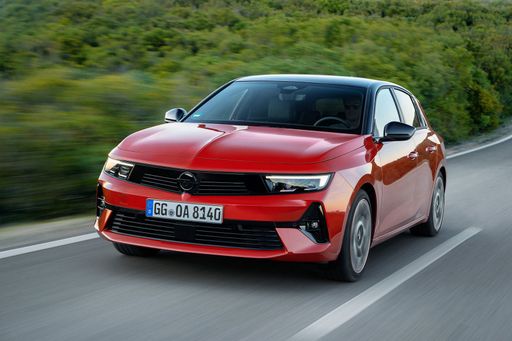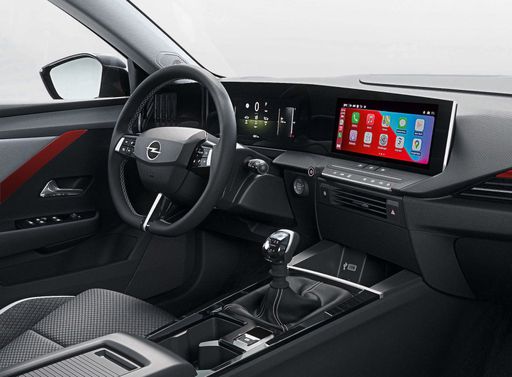Hyundai Bayon vs Vauxhall Astra - Differences and prices compared
Compare performance (90 HP vs 225 HP), boot space and price (20100 £ vs 25200 £) at a glance. Find out which car is the better choice for you – Hyundai Bayon or Vauxhall Astra?
Costs and Efficiency:
When it comes to price and running costs, the biggest differences usually appear. This is often where you see which car fits your budget better in the long run.
Hyundai Bayon has a evident advantage in terms of price – it starts at 20100 £, while the Vauxhall Astra costs 25200 £. That’s a price difference of around 5134 £.
Fuel consumption also shows a difference: Vauxhall Astra manages with 2.20 L and is therefore decisively more efficient than the Hyundai Bayon with 5.80 L. The difference is about 3.60 L per 100 km.
Engine and Performance:
Power, torque and acceleration say a lot about how a car feels on the road. This is where you see which model delivers more driving dynamics.
When it comes to engine power, the Vauxhall Astra has a significantly edge – offering 225 HP compared to 90 HP. That’s roughly 135 HP more horsepower.
In acceleration from 0 to 100 km/h, the Vauxhall Astra is significantly quicker – completing the sprint in 7.50 s, while the Hyundai Bayon takes 11.90 s. That’s about 4.40 s faster.
There’s also a difference in torque: Vauxhall Astra pulls clearly stronger with 360 Nm compared to 172 Nm. That’s about 188 Nm difference.
Space and Everyday Use:
Cabin size, boot volume and payload all play a role in everyday practicality. Here, comfort and flexibility make the difference.
Both vehicles offer seating for 5 people.
In curb weight, Hyundai Bayon is slightly lighter – 1175 kg compared to 1341 kg. The difference is around 166 kg.
In terms of boot space, the Vauxhall Astra offers barely noticeable more room – 422 L compared to 411 L. That’s a difference of about 11 L.
When it comes to payload, Vauxhall Astra slight takes the win – 509 kg compared to 460 kg. That’s a difference of about 49 kg.
Who wins the race?
The Vauxhall Astra proves to be dominates this comparison and therefore becomes our DriveDuel Champion!
Vauxhall Astra is the better all-rounder in this comparison.

Vauxhall Astra
Costs and Consumption
View detailed analysis
Engine and Performance
View detailed analysis
Dimensions and Body
View detailed analysis
Hyundai Bayon
The Hyundai Bayon slips neatly between city runabout and small SUV, offering surprising practicality and a fresh, confident design that stands out in urban traffic. It's an easy buy for shoppers who want smart packaging, tidy handling and a dash of personality without fuss — a sensible little crossover that makes everyday driving a bit more enjoyable.
details




Vauxhall Astra
The Opel Astra strikes a neat balance between everyday practicality and engaging handling, so the daily grind suddenly feels a bit less dull. Inside it's intelligently packaged with modern kit and comfortable seating, making it a very sensible pick for buyers who want a dependable hatchback that doesn't take itself too seriously.
details



|

|
|
|
|
Costs and Consumption |
|
|---|---|
|
Price
20100 - 25800 £
|
Price
25200 - 40500 £
|
|
Consumption L/100km
5.80 L
|
Consumption L/100km
2.2 - 6 L
|
|
Consumption kWh/100km
-
|
Consumption kWh/100km
15.40 kWh
|
|
Electric Range
-
|
Electric Range
82 - 419 km
|
|
Battery Capacity
-
|
Battery Capacity
51 kWh
|
|
co2
130 - 132 g/km
|
co2
0 - 135 g/km
|
|
Fuel tank capacity
-
|
Fuel tank capacity
42 - 52 L
|
Dimensions and Body |
|
|---|---|
|
Body Type
SUV
|
Body Type
Hatchback
|
|
Seats
5
|
Seats
5
|
|
Doors
-
|
Doors
5
|
|
Curb weight
1175 - 1200 kg
|
Curb weight
1341 - 1736 kg
|
|
Trunk capacity
411 L
|
Trunk capacity
352 - 422 L
|
|
Length
-
|
Length
4374 mm
|
|
Width
1775 mm
|
Width
1860 mm
|
|
Height
-
|
Height
1432 - 1488 mm
|
|
Max trunk capacity
-
|
Max trunk capacity
1268 - 1339 L
|
|
Payload
450 - 460 kg
|
Payload
414 - 509 kg
|
Engine and Performance |
|
|---|---|
|
Engine Type
Petrol
|
Engine Type
Petrol, Diesel, Electric, Petrol MHEV, Plugin Hybrid
|
|
Transmission
Manuel, Automatic
|
Transmission
Manuel, Automatic
|
|
Transmission Detail
Manual Gearbox, Dual-Clutch Automatic
|
Transmission Detail
Manual Gearbox, Automatic Gearbox, Reduction Gearbox, Dual-Clutch Automatic
|
|
Drive Type
Front-Wheel Drive
|
Drive Type
Front-Wheel Drive
|
|
Power HP
90 HP
|
Power HP
130 - 225 HP
|
|
Acceleration 0-100km/h
11.9 - 13.3 s
|
Acceleration 0-100km/h
7.5 - 10.6 s
|
|
Max Speed
-
|
Max Speed
170 - 235 km/h
|
|
Torque
172 Nm
|
Torque
230 - 360 Nm
|
|
Number of Cylinders
3
|
Number of Cylinders
3 - 4
|
|
Power kW
66 kW
|
Power kW
96 - 165 kW
|
|
Engine capacity
998 cm3
|
Engine capacity
1199 - 1598 cm3
|
General |
|
|---|---|
|
Model Year
2025
|
Model Year
2023 - 2025
|
|
CO2 Efficiency Class
D
|
CO2 Efficiency Class
D, A, C, B
|
|
Brand
Hyundai
|
Brand
Vauxhall
|
What drivetrain options does the Hyundai Bayon have?
The Hyundai Bayon is available as Front-Wheel Drive.
The prices and data displayed are estimates based on German list prices and may vary by country. This information is not legally binding.
